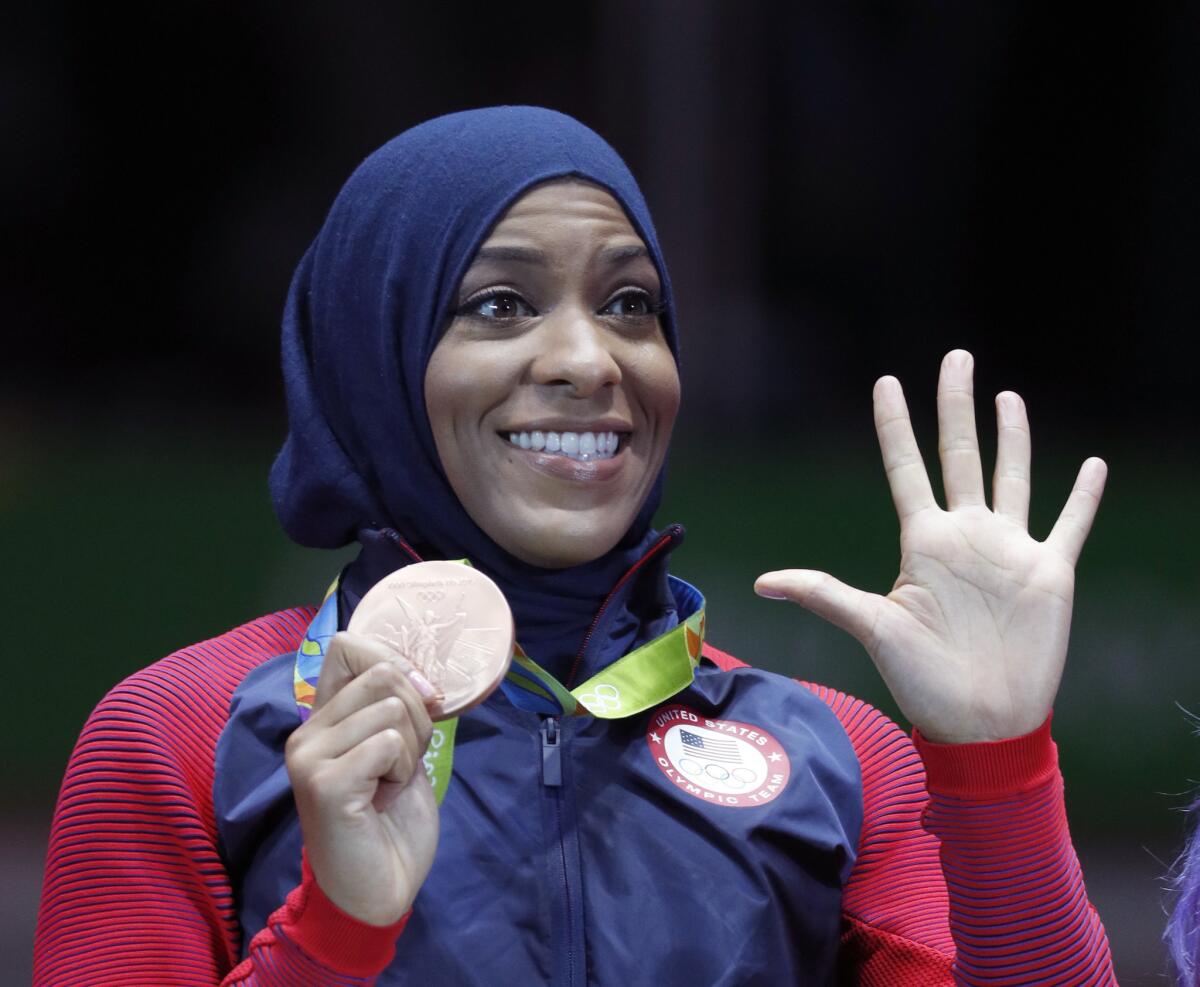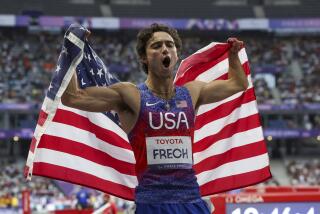How talent agencies help athletes who ‘transcend sports’ cash in on Olympics heroics

Ibtihaj Muhammad wasn’t a household name before the Rio Olympics began.
But as the bronze medal-winning fencer’s profile rose during the Games, several companies were poised to take advantage of her growing celebrity.
The first U.S. Olympian to compete in a hijab, Muhammad has been featured in TV commercials for Visa and Mini that have aired during the 17-day competition.
Muhammad’s agent, Lindsay Kagawa Colas, began discussing the fencer with prospective business partners about six months ago. Her work pitching Muhammad — and the potential for her story as a black Muslim Olympian to “transcend sports” — has paid off.
“We thought there would be brands that would be looking for that, and I think that we were right,” said Colas, a senior vice president at Wasserman, a Los Angeles-based talent representation and marketing company focused on sports.

Agents help connect Olympians with Madison Avenue and corporate America, lining up deals for endorsements, speaking tours and television commentary jobs, among other opportunities.
And some stars of the Rio Olympics, which end Sunday, could reap millions of dollars.
Among the most in-demand athletes, agents said, are those who participate in a handful of sports that have long transfixed audiences, including swimming, women’s gymnastics and track and field.
With a roughly six-week period around the Games when there is intense interest in Olympians, athletes have a limited window in which to capitalize on their success. Complicating matters, many of the deals are done as much as a year before the competition begins, agents said.
Chalk that up to the realities of the media marketplace: Companies need months to prep multiplatform campaigns, which can include TV spots, social media messaging and print ads. That’s why many deals struck by advertisers are done with bankable, superstar athletes like swimmer Michael Phelps and sprinter Usain Bolt, one of the few international Olympians with broad stateside appeal.
“Giant, multibillion-dollar companies don’t leave much to chance,” said Jeff Marks, managing director of Premier Partnerships, a Santa Monica-based sports business consultancy. “It’s all very educated and research-focused.”
Several talent agencies, in keeping with an industry-wide practice of avoiding disclosures about financials, declined to discuss the economic details of their Olympics businesses. But it’s clear that for both agencies with a concentration on sports as well as those with broader representation practices, including Hollywood powerhouse WME/IMG, the Olympics account for a meaningful piece of business.
In addition to athlete representation, some agencies have big businesses representing brands that have carved out major presences in Rio de Janeiro. For example, WME/IMG, which was created in the 2014 merger of William Morris Endeavor and IMG Worldwide, represents the likes of Visa, AB InBev and General Electric, each of which is involved in the Games.
Many agents have been in Rio over the last few weeks, though at least some are likely to have left their power suits and latte-fetching assistants at home. While there, agents have been putting in face time with advertising partners, and supporting clients who have existing promotional and media responsibilities during the Games.
(Casey Wasserman, the chief executive of his namesake company, attended the Olympics in part because he is the chairman of L.A. 2024, which is lobbying to host the Games in Los Angeles.)
See the most-read stories in Entertainment this hour »
Sometimes, new deals are discussed at the Olympics — or even get done during the event.
In one case, Colas said that an arrangement for Muhammad to make appearances in Rio during the Olympics on behalf of Samsung was finalized with the company while the fencer was there.
The Olympics economy even extends to Olympians not competing in the Games — provided they have broad appeal. A Reese’s commercial that is in heavy rotation features skier Lindsey Vonn, a star of the 2010 Winter Olympics, comically trying her hand at several summer sports. The deal for the spot came together about six months ago, said Vonn’s agent, Mark Ervin of IMG, which is a subsidiary of Beverly Hills-based WME/IMG, the largest talent agency in the world.
“You have a halo effect because Lindsey is already an Olympic gold medalist,” he said. “People also know who she is, which is what I believe makes the spots funny.”

There are examples of promotions starring Olympians going awry. Infamously, Reebok rolled out an ill-fated ad campaign before the 1992 Barcelona Olympics in support of decathletes Dan O’Brien and Dave Johnson. But the “Dan & Dave” campaign became the butt of jokes and had to be retooled when O’Brien failed to qualify for the Games.
By then, of course, Reebok’s checks had cleared.
There are some factors that mitigate Olympians’ ability to cash in on their success.
Under Rule 40, a bylaw of the International Olympic Committee’s Olympic Charter, only official sponsors of the Games may reference the competition in promotions that run during a roughly monthlong period ending Aug. 24. That’s partly why the airwaves have been flooded with advertisements from blue chip companies like Coca-Cola and Omega — which are official sponsors — but not some of their rival firms.
Rule 40 was relaxed slightly last year so that athletes can be promoted by non-official sponsors during the Games, as long as the advertisements don’t make direct references to the event. These non-official advertisers are barred from using the IOC’s intellectual property and even words including “Rio” and “gold” in their promotions.
Athletes and brands pursuing such business in the U.S. are required to receive approval from the United States Olympic Committee on a per-campaign basis. There are stiff penalties for violators: Offending Olympians can even be stripped of their medals.
“It’s certainly an improvement, but the ability for every brand to take advantage of it is pretty limited,” said Colas, whose other clients include U.S. women’s basketball team members Diana Taurasi, Brittney Griner and Maya Moore. “But I think it’s a good start.”
Companies that are not official sponsors of the Games take the rule seriously. One such firm, Richard Mille, a maker of high-end Swiss watches, declined to comment on the timepiece worn by South African Wayde van Niekerk during his gold medal-winning performance in the 400-meter race. The Richard Mille 27-02 watch, which has an open face and weighs only 34 grams — including its bright orange strap — retails for $775,000.
(Richard Mille previously has capitalized on the Olympics: Jamaican sprinter Yohan Blake wore one of the company’s watches while running in the 2012 Games in London. After that competition ended, the company named him a “brand partner.”)
Savvy advertisers have found ways to draft off the popularity of the Olympics without putting athletes in the position of possibly violating Rule 40, said David Carter, executive director of the Sports Business Institute at the USC Marshall School of Business.
“You don’t necessarily have to see the Olympic rings to know [a top athlete] is a decorated Olympian,” he said. “As long as the athlete’s brand is strong enough, the Olympic connotation exists.”
Among those ad campaigns is a high-profile effort by Under Armour that stars Phelps — and includes no reference to the Games. A commercial the company released this past spring has drawn plaudits for arresting visuals that evoke the swimmer’s preparation for what is expected to be his final Olympics.
“This one was timed certainly to take advantage of the Olympics year, and Michael’s story,” said Peter Carlisle, who heads the Olympic sports practice for Norwalk, Conn.-based Octagon and represented Phelps in the deal. “In my view, its effectiveness is … attributed to just the quality of the spot. That they can continue to activate [it] during the Games is certainly valuable for them.”
There’s another issue that could cause some Olympians to miss out on business opportunities: National Collegiate Athletic Association eligibility. Athletes who intend to retain their amateur status and compete at the collegiate level — or are already doing so — cannot accept money from advertisers. Thus, some top U.S. Olympians, including gold medal-winning swimmer Katie Ledecky, who plans to swim at Stanford University, are not cutting deals with companies.
But there are still plenty of pros who are able to profit from their success in Brazil.
Tennis player Monica Puig, who competes on the Women’s Tennis Association tour, has been drawing interest from prospective partners after beating out several favorites to win Puerto Rico’s first gold medal ever.
“It’s only been a few days since the win,” said her agent, IMG’s Marijn Bal, “but we’ve had numerous conversations with a number of brands that want to align with her.”
Follow @DanielNMiller on Twitter for film business news.
ALSO
Simone Biles’ marketability window could be small — there’s always someone new
Most Olympic athletes won’t be able to cash in on their glory
Ryan Lochte keeps sponsors for the time being
Which 2016 Rio Olympic athletes could win fashion and beauty deals?
More to Read
From the Oscars to the Emmys.
Get the Envelope newsletter for exclusive awards season coverage, behind-the-scenes stories from the Envelope podcast and columnist Glenn Whipp’s must-read analysis.
You may occasionally receive promotional content from the Los Angeles Times.











